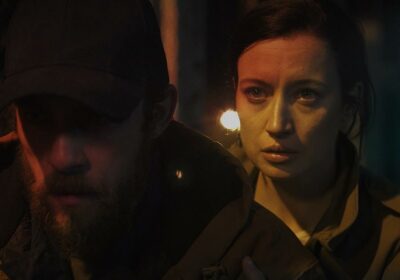Learn to Kill Your Demon in Perry Blackshear’s Fantasia Title ‘When I Consume You’

Perry Blackshear, writer-director of “They Look Like People” and “The Siren,” has returned with genre bending “When I Consume You,” a suspenseful twist on revenge and courage in the face of helplessness. Siblings Daphne and Wilson Shaw brave the long shadow of childhood trauma together in a fight with a demon stalker hellbent on their destruction.
“When I Consume You” stars Blackshear’s frequent collaborators Evan Dumouchel and MacLeod Andrews as well as new-to-the-crew Libby Ewing. In addition all three served as co-producers on the film, which was shot in lonely side streets of Brooklyn.
Variety spoke with Blackshear ahead of “When I Consume You’s” debut at this year’s Fantasia Film Festival.
The monster in the film nods to Goya’s black paintings, and has the viewer wondering throughout the film whether it is real or an element of psychosis. How did you choose to anchor the soul eater so the viewer would know his substance?
As I was writing it, there was this feeling that there’s stuff a lot scarier than death. Damnation, a bad death or a hollow death. After making “They Look Like People,” which was very deep into psychology, we wanted to try something that was more supernatural. Also, I once learned you feel pain in the same receptors that physical pain spikes when you’re very lonely. It’s very much felt in the body. And I think we wanted to bring that sort of tactile nature to this enemy rather than just an ethereal spirit.
How much of the sibling relationship was writing versus casting, and is it difficult writing new characters for actors who return for multiple films?
I really loved and cared about these characters so much. They had a really messed up childhood and reacted to it in very different ways: Wilson kind of never grew up, and Daphne grew up much too quickly. And I cared so much about doing it right. I have to say, I want to take credit for it, but, you know – these actors are incredible. Evan and Libby lived together during shooting and developed this true brother-sister dynamic. They really threw themselves at it. And I love working with the actors. I think that part of it is like: What can we make together that you want to play? Developing it together a little bit. Like what do we care about? And go from there.
“When I Consume You” uses music and sound to heighten the feeling of distress – how did you approach sound design in the film?
First I want to shout out to Mitch Bain, who did the amazing scoring. What I tried to do, both with sound design and cinematography, is to mirror the internal experience of the characters. So that feeling of totally overwhelming dissociation that happens; I wanted the sound to feel like an assault. Like you’re just, you want it to stop in the same way that one might feel in that situation. I tried to use a lot of organic sounds. Manipulated heartbeats, sort of industrial sounds, things that felt how it would to be the characters in that moment, blood ringing in your ears. Having it all stemmed from the character’s experience.
What makes the horror genre a preferred storytelling vehicle? Do you think indie horror has strengths over mainstream horror?
There is some magic about being forced to be creative. There are things you can do with the kind of intimacy and freedom that you have in these types of movies which you can’t do any other way. But I think that the things that I care about the most: Working with actors, doing something meaningful, and having a purpose behind it, there are people doing that in Hollywood as well! And it’s been exciting to begin working with them. What I love about horror is how powerful it is. It feels like when I watch a scary movie in the theater, it’s like going through a kind of timeless ritual where you die, you feel death. You get to undergo this intense pain and suffering and yet you survive, maybe stronger than when you began. This catharsis is my favorite part of the genre.
Source: Read Full Article